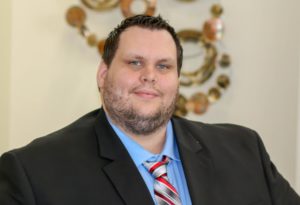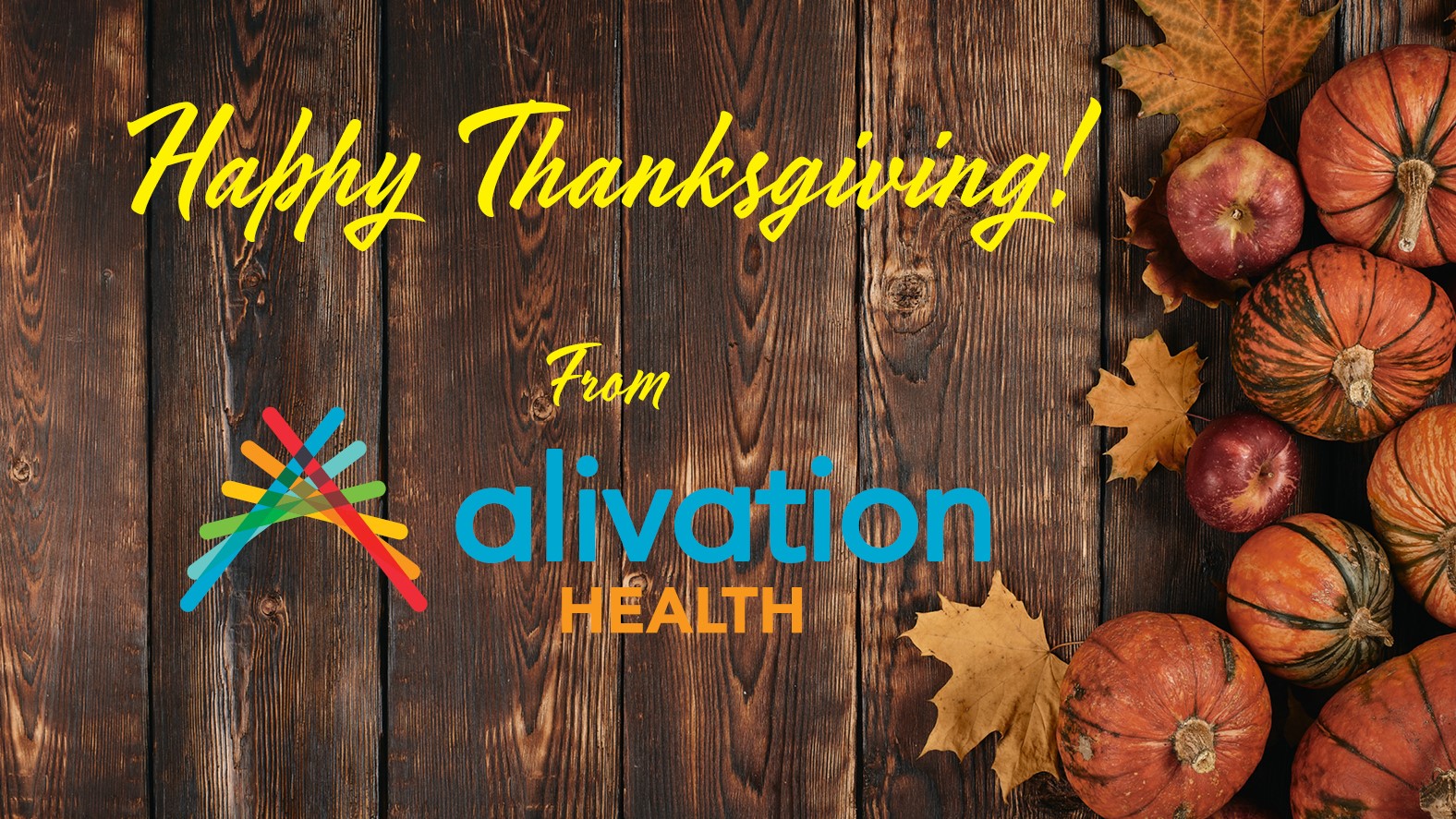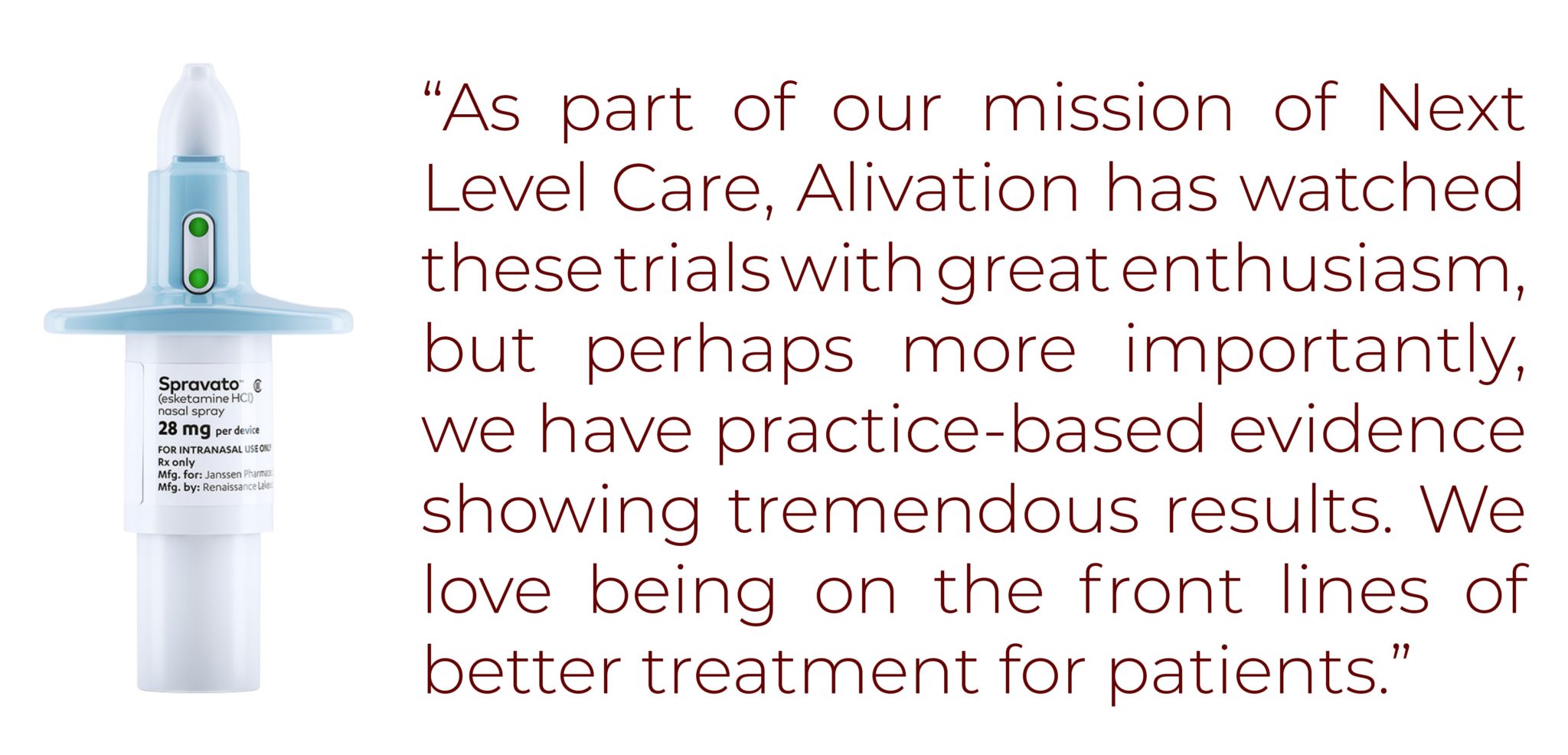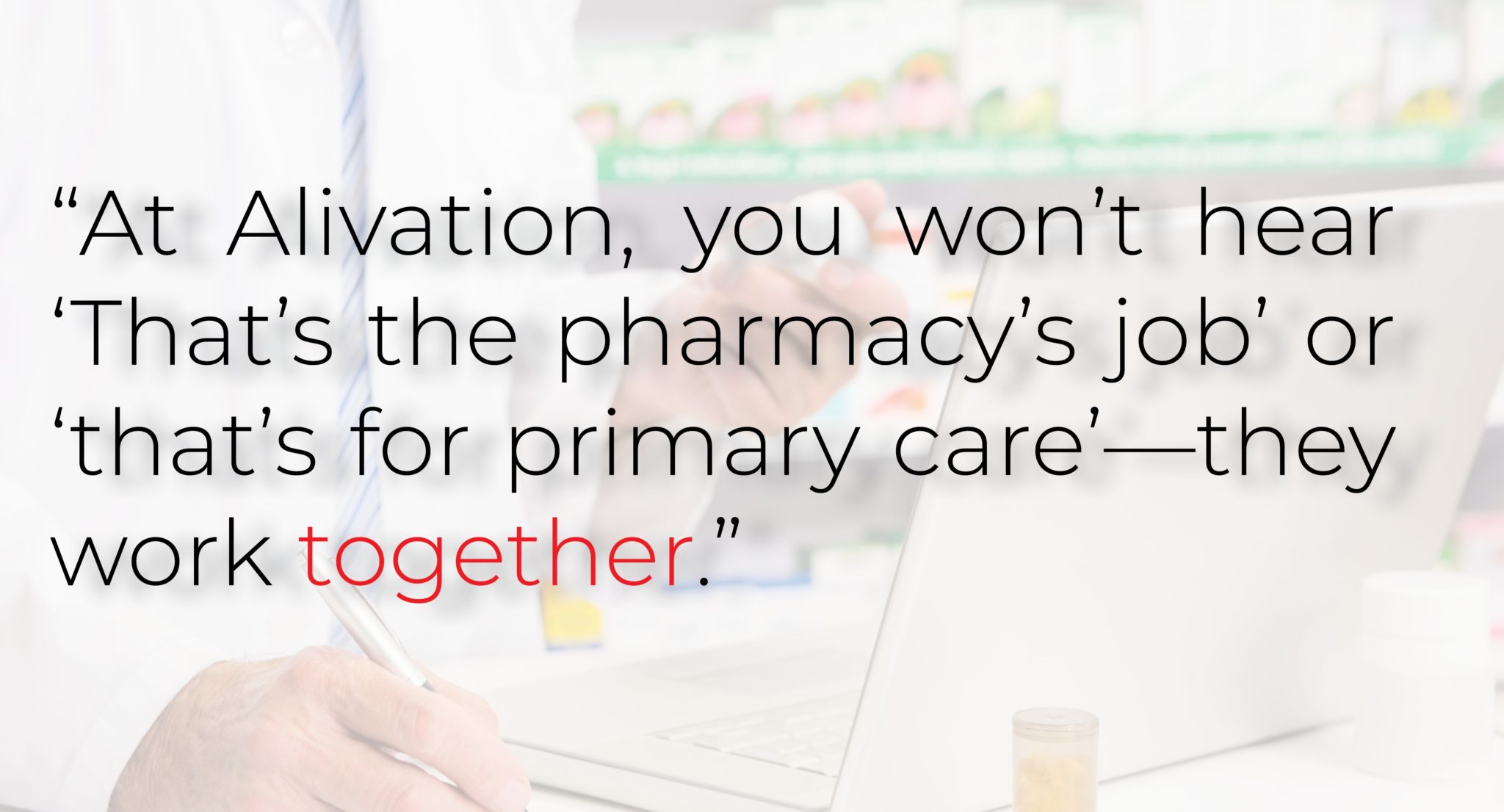Profile: Jordan Knapp
What We’re Thankful For
The Uses of Ketamine
Alivation’s Integrated Care
Profile: Jordan Knapp

Next Level Care starts with making and confirming appointments for the services you need. At Alivation, we have a series of coordinators who, as part of their jobs, make sure patients are scheduled to receive the services they need and with the team member who is best equipped to do it.
When you come in for a care, there’s a good chance you’ll get to meet Jordan Knapp. Jordan is our Collaborative Care Coordinator. He sees, on average, twenty-six people a day, and can spend anywhere from five to forty-five minutes with them, depending on what they need. The shortest appointments involve people answering basic questions and agreeing to a scheduling. The longer ones are in-depth, where patients ask questions, with Jordan walking them through their options and the science of what they’ll be experiencing.
He’s well-equipped for that.
Jordan’s passion for medicine began when his mother had a stroke while he was in high school. He was on the football team, and suddenly his world, and his priorities, had shifted dramatically. This terrible catalyst made him feel powerless. The world was now life and death terms, and with his father not in the picture, it was up to him to help his family survive. He dropped out of high school to work full time, struggling to make it work. They were homeless for a time, living in the mission, and here he saw physician’s assistants treating and washing the feet of the homeless population to earn their trust, to better care for them. It sparked a calling in him that continues to this day.
Jordan eventually went back and earned his GED, and graduated from the University of Nebraska-Lincoln with a Bachelor of Science in Business Administration and pre-medicine with an emphasis on biology and chemistry in 2016. He was the first in his family to graduate. He has a passion for neuroscience and studied under Dr. Molfese, founder of the Center for Brain, Biology and Behavior (CB3) at UNL. During his time at CB3, Jordan focused on EEGs, learning disabilities in adolescents, and concussions in athletes. He wants to go to UNMC and become a doctor. From his interactions with patients, his bedside manner and ability to be open and honest with them while explaining difficult concepts, he will make a great one when it happens. He can talk about dendrites and axons or cheek swabs one minute, and transition to simply listening to their concerns in the other. He considers himself an essential bridge between the patients and the providers who will carry out their service.
Because of his time in the mission, Jordan has a passion for service and helping the community. Each year around the holidays, he organizes a clothing donation drive for those less fortunate. He never lost touch with his roots, and he never forgot that when you’re homeless the Nebraskan winters can be unforgiving, even deadly. The gift of a coat, he says, can mean the world to someone who is living on the street and lacks warmth.
Jordan has helped thousands of people while here, and likely will continue to help thousands more in the future. He serves a wide, diverse population and can do so with a smile and cheerful demeanor the entire time. He’s one of the friendliest people you’ll meet. Jordan exemplifies our Next Level motto. From his challenging beginnings to his ultimate achievements, he is one of the best examples we have.
What We’re Thankful For

It’s Thanksgiving week, and though we don’t have a costume contest at Alivation, we still celebrate the holidays just the same. We love Thanksgiving: food, family, a day off from work. It just has a little bit of everything. One of the things that goes along with the holiday is saying what you’re thankful for.
Alivation is no different.
We’ve been around a long time. Premier Psychiatric, our former company name, was founded in 1998. We rebranded almost two years ago to what we are now. 20 years is an excellent run for any company, and we’re thankful—beyond thankful—for the longevity. We’re thankful for the ability to keep serving patients, keep trying new technologies, keep doing better and doing all that we can.
Mostly, we’re thankful for the patients.
Everything we do, and all the great things we have achieved, are both for and by patients. We see hundreds of them a day. Their business keeps us in business, and we’re thankful that for all these years, and in whatever name incarnation we are in, they trust us to do a great job. They trust Dr. Duffy and have for many years. They trust our staff, our providers, our nurses, our care coordinators. We can only help if there is mutual trust. We’re thankful for that trust, as it is crucial to doing a great job.
We’re thankful that the regular business of our patients has allowed us to invest in new treatment and assessment technologies, and new, dynamic employees to use those technologies. We’re thankful for the opportunity to advance the understanding of brain and behavioral health, and to help more people than we previously could. Every day we reach someone new who needs us is a great day. Every person we see is an opportunity to positively impact someone’s life, challenge ourselves, work harder, and build and grow while helping.
We’re thankful that our patients and staff have helped us live up to the Next Level Care motto. We’re thankful that they trust and believe in us to partner in their care. We’re thankful people are willing to do all that is necessary to reach that Next Level, and their hope and commitment inspires us daily to do all the things we promise to do. We’re thankful they help us uphold our core values. Without those values, we wouldn’t be what we are today. We wouldn’t have the discipline, humility, drive, passion, and openness that it takes to do truly extraordinary things in this field. We’re thankful we stand out from the rest.
We’re going to keep growing. We’ve added many new people to our team this year, and we’re thankful for all of them. They love working here, and we’re thankful we’ve spent the time and effort to build the kind of company people want to work at. Our company culture didn’t happen overnight, and we’re very grateful for all the staff that work to make this company inclusive, efficient, warm and essential. This time next year, I’m sure we’ll be thankful for even more great new people who’ve joined our ranks.
We’re thankful to be in your lives. We’re thankful to help. We’re thankful people believe in our mission, and come back to allow us to help them with some of the most trying challenges they may face. We’re thankful that we’re not just a medical facility, but a place that can help, a place that invites everyone to work together to be the Next Level. We’ll never stop being thankful for it, even if we mainly acknowledge these things around Thanksgiving. We’ll never stop doing all the things we do, because they’re the right things to do.
Thank you to everyone who has helped make it all possible.
The Uses of Ketamine

If you were to Google ketamine, any number of things would show up. If you talked to someone on the street, they would likely know it as a club drug or a tranquilizer for farm animals. It would be unusual if they knew about the ongoing research and trials of this treatment, and about how excited the medical and research communities have gotten about it in recent years. Ketamine is a fascinating, exciting topic of interest because of its possibilities for depression treatment, and this is what Alivation uses it for.
Ketamine is administered via a nasal spray or an IV. At Alivation, we offer the nasal spray. For recurrent depression, this is administered once a week. Some doctors and scientists say, with evidence, that this might be the most important treatment for depression that’s come along in years. Numerous studies have shown this, and though it is not yet FDA-approved, clinical trials are ongoing and show great promise. As part of our mission of Next Level Care, Alivation has watched these trials with great enthusiasm, but perhaps more importantly, we have practice-based evidence showing tremendous results. We love being on the front lines of better treatment for patients.
Ketamine works far more rapidly than other antidepressant medications—one of its main virtues. Sometimes doctors prescribe ketamine along with an antidepressant. The ketamine is taken in the weeks before the prescription begins to work, providing faster relief from symptoms of depression. Those can be critical weeks for the patient. At low doses, ketamine also helps sedatives work, and is sometimes administered after surgery.
One of the best uses of ketamine is decreasing suicidal ideation. Because it creates a euphoric effect at the right dose, ketamine, for individuals who are contemplating or have attempted suicide, works. The right euphoric feeling, coupled with a decrease in depression in the brain, can provide the essential window that might save someone’s life. It’s easy to see the benefits of such a thing. If a chemical imbalance is the problem, the treatment is to alter the chemistry.
Alivation uses ketamine for this and other purposes because it has shown results. The biggest thing to remember about ketamine, per doctors, is to temper expectations for the treatment. Those who expect a miracle cure overnight, or who’ve only heard the outstanding benefits need to know that the trials for it are ongoing, show great promise, and with the correct understanding and expectations, this treatment can prove very effective for many people. Like many things, it may not work for everyone. But the fact it works for some is an excellent reason to keep exploring it as a treatment possibility. The research will always follow ideas that can save lives.
With suicide such a global problem, and clinical depression often being debilitating for a great many people, the idea that a nasal spray could prevent or alleviate the symptoms is wonderful. The situation now is to earnestly follow the trail wherever it leads, always embracing the science and the real life results we witness in our office. If you’re interested in ketamine or want to help expand this area of research, check out our studies online for any available dealing with this. Research and use the resources at the end of this article to become informed about ketamine. Explore options. Ask friends and family about it.
If you suffer from depression or suicidal tendencies, call us about options or if you just want to learn more about this exciting new treatment possibility. We’re always happy to provide information, and we’re always researching the Next Level treatments of tomorrow.
Alivation’s Integrated Care

If you’ve ever read about Alivation, or even heard us speak about it, you know we use the term integrated care frequently. We use it often because it’s the entire backbone of our services, outlook and organizational setup. But is it just a buzz term? Something we picked because it sounds good, corporate speak that’s purposefully vague?
Quite the contrary.
Integrated care is a concept used widely. The largest integrated care delivery system in the United States is the U.S. Department of Veterans Affairs. According to the NCBI, the two largest private delivery systems are Kaiser Permanente and the Mayo Clinic. It’s likely you’ve heard of all three, and just as likely that you’ve even received care from one of them in the past. Alivation Health, while a bit smaller than those, follows the same framework of integration.
Here’s what that means, simplified: coordination of care and services overlap. It is different than horizontal or vertical integration in that there is significant collaboration and overlap of services between our brain health and primary care specialties, Alivation Pharmacy, and Alivation Research. Each operates with their own autonomy, but they are in constant contact with one another, and function as a collective team when providing whole person, integrated care.
At Alivation, you won’t hear “That’s the pharmacy’s job” or “that’s for primary care”—they work together. They hand off when they need to, pick up where they can (or should). But integrated care isn’t limited to the U.S.—it is a worldwide concept. Even the World Health Organization has specific guidelines for the integration of healthcare around the world. They stress the importance of the framework, while also emphasizing the necessity of availability for the services and care listed.
So why is it important?
Simple: we feel it is the best healthcare delivery system. On top of just making sense for our organization, the integrated care framework is a proven model that has excellent successes. The quality of life and the quality of outcomes we’ve seen have only reinforced our position over the years. We can’t help but believe in it now. It’s crucial that brain and mental health be treated as importantly as physical health. The brain only functions properly if the body functions properly, and vice versa. Much like our care framework, the body is all integrated. We like to think we’ve taken the design from nature, and the human body itself.
The key challenge is to make sure it all runs smoothly. Again, like the human body, the engine must be functioning correctly for everything to work as it should. Communication is a crucial component. Our entire culture is very proactive in working together, communicating challenges, and speaking freely about good ideas as they come. We like to hear from everybody who works here. There isn’t the usual hierarchy, and conventional wisdom is always game to be questioned and tested.
So, though we do integrated care as well as the largest providers in the U.S., we also do it interpedently and have our own ideas. It keeps us unique and keeps us focused. It keeps our patients happy and healthy and delivers the best in the best way we know how. It’s part of the Next Level Care definition.
